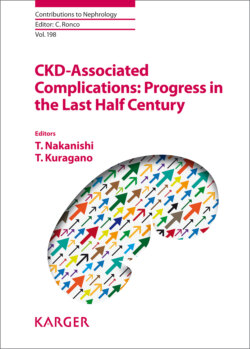Читать книгу CKD-Associated Complications: Progress in the Last Half Century - Группа авторов - Страница 31
На сайте Литреса книга снята с продажи.
Frailty
ОглавлениеFrailty encompasses the deterioration of a wide variety of systems. The Japanese Society of Gerontology issued a statement regarding frailty in 2014. The statement describes this condition as the reduction of physiological reserve due to advanced age, increase in vulnerability to insults, and a predisposition to conditions relating to worse outcomes, such as disability or even death. The scope of frailty is wide, and many concepts of frailty have been proposed, including physical frailty, cognitive frailty, oral frailty, and social frailty. The major point in this concept is that frailty is a reversible condition: appropriate management can reverse it, and early intervention is warranted [2].
Fried et al. [8] described the criteria for physical frailty in the Cardiovascular Health Study. Several other definitions have been proposed, but most are based on the cardiovascular health study criteria. Two meta-analyses reported the incidence of frailty among patients with ESRD. One revealed that the incidence was 37% for objective criteria (95% CI 30–44%) and 67% for patient-reported criteria (95% CI 59–75%) [9]. The other showed similar results, with an incidence ranging from 14 to 73% in hemodialysis patients [10].
A well-known study by Johansen et al. [11] demonstrated that frail patients had higher all-cause mortality (HR 2.24; 95% CI 1.60–3.15) and a higher rate of the composite endpoint of combined death and hospitalization (HR 1.56; 95% CI 1.36–1.79). A meta-analysis of elderly community dwellers showed that frailty was significantly associated with a higher incidence of falls (OR 1.84; 95% CI 1.43–2.38), potentially leading to worse survival [12]. A study investigating factors that promote frailty in dialysis patients found that higher interleukin-6 and hospitalization in the last year were significantly associated with the progression of frailty scores [13].
Other types of frailty have a substantial impact on clinical outcomes. Social frailty can be associated with the progression of disability and loss of activities of daily living (ADL). Oral frailty is also associated with physical frailty, sarcopenia, progression of disability, and death, although these findings were from a study involving older persons living in the community [14]. In relation to oral frailty, dialysis patients have substantial problems with oral health. A meta-analysis demonstrated that gingivitis can be found in 56.8% of them (95% CI 39.3–72.8%) and that 20.6% (95% CI 16.4–25.6%) were edentulous [15]. The latter condition can mitigate an appropriate dietary intake.
